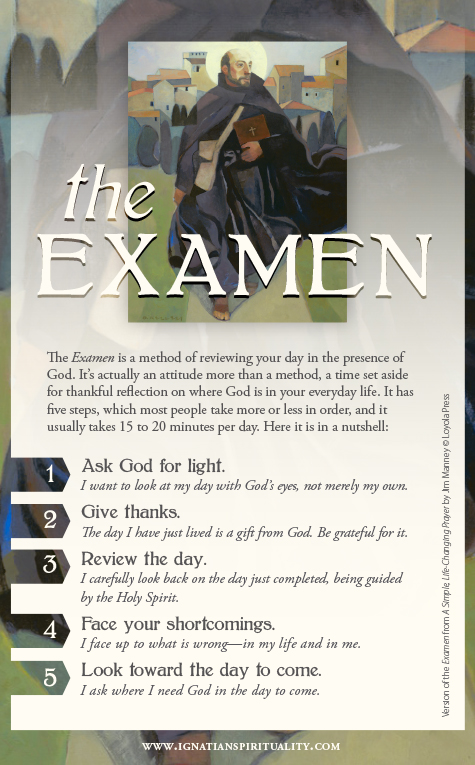 In high school I knew I wanted to go to a Jesuit university, and I prayed every day to St. Ignatius during my senior year. When my acceptance letter came from Fordham, I attributed it to his intercession. I loved Ignatius!
In high school I knew I wanted to go to a Jesuit university, and I prayed every day to St. Ignatius during my senior year. When my acceptance letter came from Fordham, I attributed it to his intercession. I loved Ignatius!
Yet, it was not until I found myself in a place of deep depression during my sophomore year of college that I really began to love Ignatius. Long story short, college was not going as planned. I had transferred campuses (which was basically like having another freshman year all over again) and was dealing with some personal challenges. I felt confused and angry. One night, I dragged myself to an event at one of the Jesuit residence halls. When a young Jesuit scholastic began telling the story of Ignatius, it was like I heard it through new ears. Things did not go as planned for the young Ignatius, who had dreams of becoming a knight. Instead, he found himself gravely wounded. There was nothing much he could do and all that was available to read were books about the life of Jesus and the saints. Yet, in time, Ignatius grew intrigued by these books and through them, he realized God was calling him to do great things. He found something better than his original dreams.
Even though Ignatius lived hundreds of years before I did, I saw my own story in his and I felt comforted. I became active on campus even though I was frightened, and immersed myself in my studies. By the time I entered my junior year, I was thankful that my eighteen-year old plans for myself did not work out for me. While I cannot say that I did anything as spectacular as found a new religious order, I found a lifelong love for theology. I do not think I could have gotten through so many years of school without the inspiration of St. Ignatius.
 The Examen
The Examen
Had I not learned to pray the Examen, I probably would have gotten any sleep in college (or grad school). Talking to God as a friend before bed helped me deal with all the thoughts that managed to invade my brain at two in the morning. The second step of the Examen, “reflecting on the day with gratitude,” helped me find God not only in times of joy, but in times of stress and confusion. My closest friends from college are atheists but they loved hearing about how I have seen God in them—when they made me laugh, when they lifted my spirits in times of sadness, or when they kidnapped me and dragged me out of my dorm room for some fun and relaxation because I was studying too hard.
This does not mean the Examen turns people into total optimists. Some days it is harder to recognize God than others, which is why the third step asks us to pay attention to our emotions. Sometimes the emotions I felt were anger or even doubt (“God I’m not sure you exist today, not sure I feel like talking.”) but that was OK. – I could let it out and pray about it.
The Examen should also not be mistaken for a passive resignation in the face of our struggles and difficulties. The last part of the Examen asks us to “look forward to tomorrow,” to discern how to approach the challenges that we ourselves, or others, may face. We may be motivated to answer a flier looking for volunteers, to call a friend or family member, to start eating better, to make an appointment with the professor of a particularly difficult class. Long term, such discernment can help us find our gifts and passions, and help us use those talents to be “people for others.” Of course, I am not saying the answers will all come quickly or easily, nor will they necessarily be 100% clear. But Ignatian discernment is much more practical than pulling an all-nighter, or simply going with the whims of peer pressure. As Karl Rahner would say, knowledge of self and knowledge of God are interdependent.
So, to all those who are planning orientations and events at Jesuit high schools or universities this fall, do not be afraid of sharing the story of Ignatius or teaching the Examen. Yes, you may worry that students will not care (and maybe a lot won’t!). The room may be filled with students who are not religious. You may think some of the faces in the audience look bored. Do it anyway. You might touch someone and you might provide just what that person needs to get through school.









Kate, this is excellent. Thank you very much.
Loved it thanks!
It is always interesting to me that more people are not deeply involved in Ignatian Spirituality. It is sort of guide map for life. My faith life took a turn when I started to attend Mass at a Jesuit Apostolate near me. it became my parish, changed me and enriched my prayer life. The Examen always is a struggle for me, but practice makes perfect! Thank you for showing how all these ideas can be applied to current times!
Thank you for sharing your experience! So many can relate! It is teaching without preaching! Telling our stories is so important! I will pass this along to the high school students I meet. I will encourage them to write and share their own stories.
You wrote this a long time ago, but thank you! I’m a spiritual director, steeped in the gifts of the Exercises, worshiping in a faith tradition where he is mostly unheard of. Sunday I will face a room full of college students beginning a new semester. Your words encourage me to offer who I am and what I have found to be life giving in my relationship with God and then to trust how God uses it. Thank you! (By way of a P.S.–Are you familiar with materials that present the Exercises in manageable “bites” for college students without doing the whole Exercises??).
Thank so much for your response! Last year, I just gave my students a copy of a 5-step version of the Examen. http://www.ignatianspirituality.com/ignatian-prayer/the-examen What I like is that it is something quick enough to do in class, but also something they can easily take with them and do on their own without making a huge time commitment.